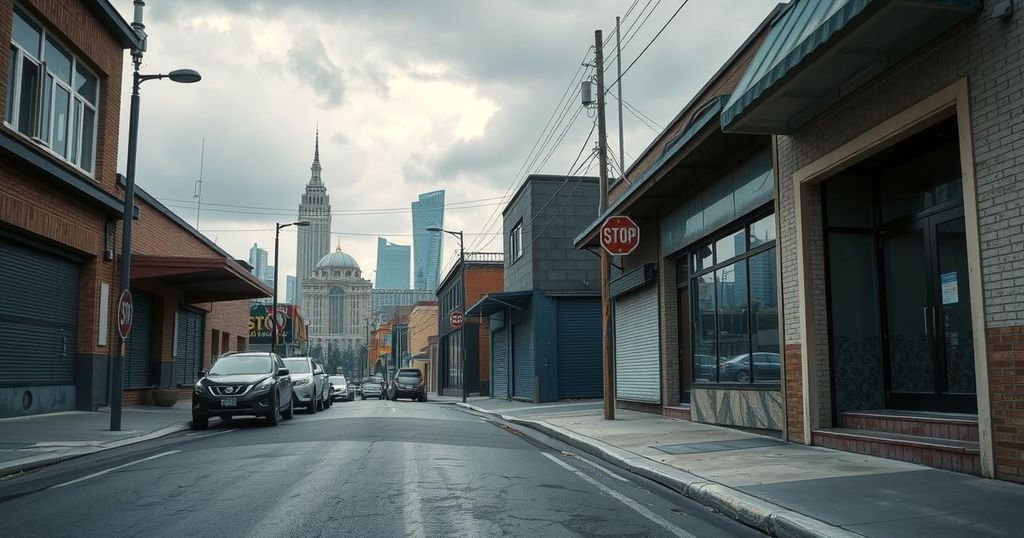Kosovo’s Lumbardhi cinema faces closure after the EU cancelled a vital 1.5 million euro grant due to sanctions against the government of Albin Kurti. More than a dozen projects worth 150 million euros are stalled, amid growing concerns regarding their reliance on international support as elections loom on February 9. Polls indicate declining support for Kurti, highlighting issues of isolation and public dissatisfaction stemming from rising ethnic tensions.
In Kosovo, the Lumbardhi cinema has long served as a cultural hub, showcasing international films and hosting festivals. However, financial struggles have plagued the venue, and it depended on a 1.5 million euro grant from the European Union for renovations. Unfortunately, EU officials notified the executive director, Ares Shporta, on October 7 that the grant was canceled due to sanctions against Kosovo’s government related to rising ethnic tensions in northern Kosovo.
The cancellation has disrupted more than a dozen projects worth over 150 million euros, including vital infrastructure such as a sewage treatment plant and cultural renovations. Even as Kosovo’s government attempts to downplay the sanctions, the fiscal impact is stark, highlighting the vulnerability of one of Europe’s poorest nations as it prepares for elections on February 9, which may affect Prime Minister Albin Kurti’s re-election prospects.
Recent private polls indicate that Kurti’s party Vetevendosje and its partners have lost voter support, dropping from 50.2% in 2021 to around 40%. Concerns are surfacing among Kosovans regarding their country’s isolation amidst the sanctions, with political analyst Agon Maliqi suggesting voters may not see the sustainability of Kosovo’s control in the north without international backing.
Within the EU, there is a divide regarding the sanctions. Some members argue they should be lifted since they have negatively impacted ordinary citizens without altering Kurti’s policies. In contrast, Serbia-friendly countries like France and Hungary oppose any lifting. A senior diplomat indicated that the sanctions predominantly affect Kosovo and question their efficacy, yet caution that no mechanism exists to retract the measures.
While Kosovo declared independence from Serbia in 2008 with U.S. support, tensions under Kurti’s leadership have strained relations. His government has resisted EU proposals to create an association of Serb municipalities, heightening ethnic tensions and leading to violence in 2023. Despite this, Kurti asserts that his policies aim to protect Kosovo, not to target Serbs.
The repercussions of the EU sanctions extend to daily life, with Kosovan Serbs facing significant challenges, including restricted access to services and trade disruptions. The lack of a sewage treatment plant, also affected by the sanctions, exacerbates public health concerns as waste management issues persist throughout Pristina.
Residents of Kosovo, regardless of ethnicity, acknowledge the adverse effects of the EU’s measures. For instance, local resident Sanije Thaci expresses distress over the unsanitary conditions surrounding her home, indicating the community’s growing frustration with political decisions that directly affect their livelihoods.
Kosovo’s political landscape is fraught with ethnic tensions, particularly between the majority ethnic Albanians and the minority Serbs. Since declaring independence from Serbia, Kosovo has struggled with its international relationships, notably with the EU and Serbia. The political actions taken by Prime Minister Albin Kurti, aimed at asserting control over the northern regions, have sparked sanctions from the EU due to escalating ethnic tensions. As Kosovo prepares for elections, the implications of these sanctions are becoming increasingly significant for its governance and public welfare. The Lumbardhi cinema represents a vital cultural institution within Kosovo, highlighting the community’s desire for engagement with global cultural narratives. The financial aid from the EU was intended to enhance such cultural infrastructure but has been jeopardized by political dynamics and sanctions, affecting both local pride and economic development. The elections scheduled for February 9 are positioned against this backdrop of crisis, added pressure from civic unrest, and socio-economic challenges resulting from international political decisions.
The EU sanctions imposed on Kosovo due to rising ethnic tensions have created significant obstacles for cultural and infrastructural initiatives, particularly affecting places like Lumbardhi cinema. These challenges come to a head as Kosovo approaches critical elections that could determine the future of its leadership under Prime Minister Albin Kurti. The growing skepticism among citizens regarding the government’s ability to maintain relations with the international community, coupled with internal divisions, will likely influence the electoral outcomes in February. The repercussions of political actions on everyday life are evident, echoing a sentiment of frustration among the populace as they seek solutions amid ongoing hardship.
Original Source: www.usnews.com






